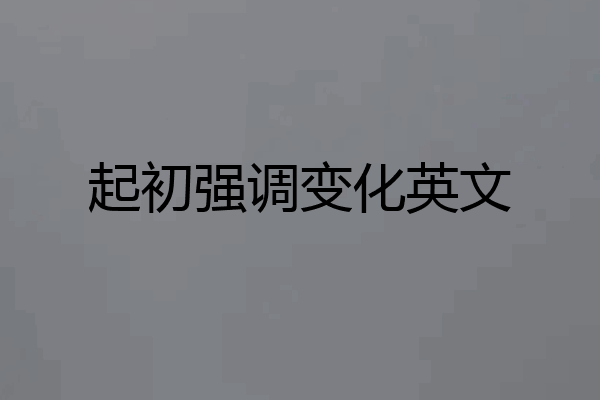
wangeunice
不一样。具体区别如下:
1、具体含义不同
at the beginning的意思是起初,刚开始,不暗含着后来又变化的意思。
in the beginning 的意思是起初;在开始的时候,暗含着后来又变化的意思。
2、用法不同
at the beginning通常接of短语,后面接表示时间或事件等的名词。
in the beginning通常单独用作时间状语或定语,较少跟of短语连用。若表当今世界的开头,须用in the beginning 。
例句:
They uncovered the statue at the beginning of the ceremony.
仪式开始时,他们揭去了塑像的罩子。
In the beginning he had felt well, but little by little he was becoming weaker.
一开始他感觉很好,但慢慢地就变虚弱了。
扩展资料
词汇解析:
1、at the beginning
英文发音:[æt ðə bɪˈɡɪnɪŋ]
中文释义:起初;刚开始
例句:
At the beginning of liberation, the factory was an awful mess.
解放初,这个工厂是个烂摊子。
2、in the beginning
英文发音:[ɪn ðə bɪˈɡɪnɪŋ]
中文释义:在初期
例句:
It was in the beginning, when we were still ironing out problems
那是在刚开始,我们还在着力解决问题。


养鱼的老头
起初的英文:
一、originally
英 [əˈrɪdʒənəli] 美 [əˈrɪdʒənəli]
adv.本;起初,原来;独创地,独出心裁地;自来
1、It is not known whether the bomb was originally intended for the capital itself
尚不清楚炸弹起初的轰炸目标是否是首都。
2、Japan had originally demanded the return of two seamen held on spying charges.
日本起初要求放回两名以间谍罪名遭拘留的海员。
二、at first
英 [æt fə:st] 美 [æt fɚst]
起初,当初
1、At first I felt very resentful and angry about losing my job
起初我对丢掉工作感到非常怨恨和恼怒。
2、At first I gave him the benefit of the doubt
起初,我姑且相信了他。
扩展资料
词义辨析:firstly、first of all、at first
1、firstly和first (of all)均用以引出一系列事实、理由、意见等:
The brochure is divided into two sections, dealing firstly with basic courses and secondly with advanced ones.
小册子分为两部分:第一部分涉及基础课程,第二部分涉及高级课程。
2、firstly在英国英语中比在北美英语中更通用。
3、at first用以讲述最初阶段的情况,尤指与后来的不同情况相比较:
Maggie had seen him nearly every day at first. Now she saw him much less.
起初玛吉几乎每天都见到他,现在见到他的次数少得多了。

艺术边上观望
at the beginning与in the beginning不同,区别如下:1)in the beginning通常单独用作时间状语或定语,而较少跟of短语连用,其意义为:“起初”、“在开始的时候”,暗含着后来有变化的意思。例句:In the beginning we thought we'd never get it all arranged. 在开始的时候,我们以为不会把它全安排好。In the beginning I felt very lonesome in London. 起初,我在伦敦觉得非常孤独。2)at the beginning常常跟of短语连用(如of the week, of the year, of the book等),如果后面没有跟of短语,则大都可以从上下文看出来。例句:At the beginning of this century a great many Europeans went to live in the USA. 本世纪初许多欧洲人去美国居住。Start at the beginning and read until you get to the bottom of Page Five. 从第5页开头开始读,一直读到第5页末尾。

橄榄色的水
at the beginning与in the beginning在用法上有一些区别。in the beginning通常单独用作时间状语或定语,而较少跟of短语连用,其意义为:“起初”、“在开始的时候”,暗含着后来有变化的意思。如:1. In the beginning we thought we'd never get it all arranged. 在开始的时候,我们以为不会把它全安排好。2. In the beginning I felt very lonesome in London. 起初,我在伦敦觉得非常孤独。at the beginning常常跟of短语连用(如of the week, of the year, of the book等),如果后面没有跟of短语,则大都可以从上下文看出来。如:1. At the beginning of this century a great many Europeans went to live in the USA. 本世纪初许多欧洲人去美国居住。2. Start at the beginning and read until you get to the bottom of Page Five. 从第5页开头开始读,一直读到第5页末尾。注意:at the beginning 在单独使用时,有时与in the beginning同义。如:1. He disliked it at / in the beginning. 起初,他并不喜欢它。2. At / In the beginning he wasn't interested in it. 开始,他并不感兴趣。

慕容诗月
change; variety; varychangevt.改变,变更; 交换,替换; 兑换; 换衣服(床单)vi.改变,转变; 交换,互换; 换衣。更衣n.变化,改变; 交换,交替; 零钱,找头; 代替物varietyn.多样; 种类; 杂耍; 变化,多样化复数: varietiesvaryvi.变化; 不同,偏离; [生]变异vt.使不同; 使多样化; [音乐]变奏过去式: varied 过去分词: varied 现在分词: varying 第三人称单数: varies易混淆的单词:Vary

兔兔我要幸福
1、含义不同
alter 指轻微的改变,强调基本上保持原物、原状的情况下所进行的部分改变。
change 指任何变化,,完全改变,,强调与原先的情况有明显的不同。
2、词性不同
change 可作名词、及物动词、不及物动词。
alter可作及物动词、不及物动词。
3、读音不同
change 英 [tʃeɪndʒ] 美 [tʃendʒ] alter 英 [ˈɔ:ltə(r)] 美 [ˈɔltɚ]
同义词alter,
英 [ˈɔ:ltə(r)] 美 [ˈɔltɚ]
vt.改变;更改;改建(房屋);(人)变老
vi.改变;修改
1、Little had altered in the village
村子里几乎没有什么变化。
2、They have never altered their programmes by a single day.
他们一天也未变更过他们的节目。
3、Diet and exercise will alter your shape
节食和锻炼会改变你的体形。
4、The fact that she had become wealthy did not tempt her to alter her frugal way of life.
她有钱了,可这丝毫没能让她改变节俭的生活习惯。